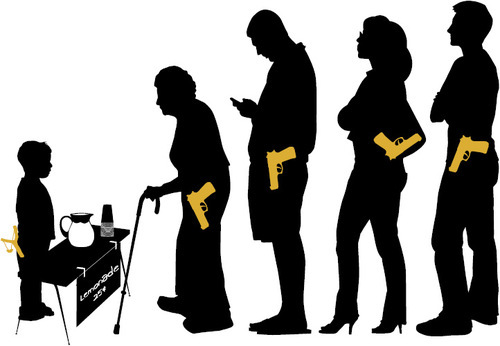This is an archived article that was published on sltrib.com in 2011, and information in the article may be outdated. It is provided only for personal research purposes and may not be reprinted.
As some politicians nationally look to enact new gun restrictions in the wake of the Arizona shooting rampage that left six dead, a Utah lawmaker is looking to Arizona as a model to eliminate gun laws.
Rep. Carl Wimmer, R-Herriman, is having a bill drafted that would allow gun owners to carry a concealed, loaded gun almost anywhere in the state — essentially doing away with Utah's long-standing concealed weapons permit process.
"It allows law-abiding citizens of Utah to carry a firearm for their own personal self-protection with or without a concealed-weapons permit," Wimmer said Wednesday.
Three states currently have a "constitutional carry" law: Vermont, Alaska and Arizona, which passed the measure last year.
It would liberalize Utah's already permissive gun laws, which currently allow anyone to openly carry an unloaded weapon and those with a concealed-weapons permit to carry a loaded, concealed gun.
To get a permit, the applicant must have a clean record and take a course on weapons laws. More than 250,000 people have sought a Utah permit since it began issuing them in 1995, though, especially in recent years, most have been issued to people living outside Utah because its permit is honored in 32 states.
Wimmer's bill would allow any citizen over the age of 21 to carry a concealed weapon without a permit in Utah, Wimmer said, provided they don't have a record of serious crimes or mental illness and "feel comfortable in their abilities to exercise that right."
"It allows people to make that individual choice for themselves," he said.
He said people would still seek Utah's concealed-weapons permit because it allows them to carry concealed weapons when they travel outside the state. About 70,000 people applied for permits last year, with 72 percent from out of state.
Federal background checks and restrictions on firearms would still apply.
The planned bill comes after the attempted assassination of Arizona Rep. Gabrielle Giffords and has prompted proposed federal legislation to restrict certain large clips, require background checks at gun shows and prohibit guns near members of Congress.
But Wimmer said he doesn't expect his bill will be hindered by that fervor.
"Someone who is dead set on mass murder is not going to let the fact that they do not have a concealed-weapons permit stop them from carrying out that crime," he said.
Indeed, Arizona's concealed-weapons law doesn't appear to have contributed to, or hampered, the rampage.
Wimmer's bill also comes amid a dispute between the University of Utah and gun advocates and lawmakers on whether the school can require weapons-permit holders to conceal their guns on campus. Wimmer is considering a separate bill that would clarify that the U. cannot require permit holders to conceal their weapons.
Rep. Stephen Sandstrom, R-Orem, had planned to sponsor the legislation, but he handed it off to Wimmer because Sandstrom is focused on sponsoring immigration legislation modeled after Arizona's law.
Clark Aposhian, chairman of the Utah Shooting Sports Council, said his group supports Wimmer's bill.
"We think it is a very small step in legislation from where we are right now to where we would be with passage of the bill, but it is a big step for lawful self-defense," he said. "I don't think there's any pattern of misuse in Alaska, Vermont or Arizona."
But Steve Gunn with the Gun Violence Prevention Center, said allowing more concealed weapons on the streets makes it more dangerous for residents.
"I think Mr. Wimmer does the state a disservice by making it easier for people to carry concealed firearms," he said. "My feeling is we ought to be going in the opposite direction. … I think we should become much more restrictive."
He said applicants for a concealed weapon should be required to show they know how to fire a gun — which is currently not part of the state's criteria.
Sen. John Valentine, R-Orem, had been considering legislation to require a demonstration of firearms proficiency because Nevada and New Mexico had stopped honoring the Utah permit.
But Valentine said Wednesday he's going in a different direction. He said those states were more concerned about losing revenue from their own permits, so his bill would allow out-of-state residents to get a Utah permit after they've already obtained one from their home state.
That would maintain the other states' revenues and enable their residents to get a Utah permit if they choose, since it would be widely accepted. —
What Utah'scurrent law says:
The state's concealed-weapons permit requires a criminal-background check and completion of a firearms-familiarity course. The permit is valid throughout the state for five years, without restriction, except in a correction or mental facility, a place of worship, a home or an airport.
:
A secure area in a corrections facility, mental institution or courthouse.
An airport secure area.
Any house of worship or in any private residence where dangerous weapons are prohibited.



